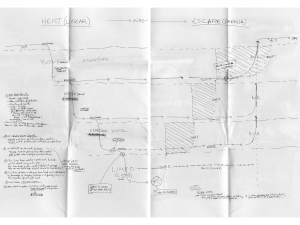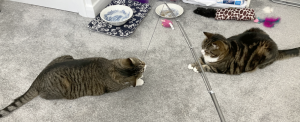Hi there,
We’re back to gloriously sunny but really quite nippy weather again, so I’m getting chewed out by Copurrnicus who really wants to go outside but there’s frost on the ground and he doesn’t like it. Grabbity’s chewing me out because she doesn’t like the food that’s down. And my subconscious is chewing me out because I had a slow start to the day. Stupid subconscious.
WAIW?: Fear of the blank page, clearing your mind and productivity
Last week, I spent quite a bit of time working on my new Substack newsletter, Why Aren’t I Writing?, in which I’m exploring all the things that get in our way and stop us writing. I’ve now got three posts up:
- First, deal with The Fear, which looks at the fear of the blank page that, even after years and years of writing professionally, I still feel.
- Adulting, procrastination and freeing up space for creativity, in which I talk about how important it is to keep on top of your life admin so that you can clear space in your mind for more creative things.
- Five productivity hacks to kickstart your writing, which does pretty much what it says on the tin and provides five different ways to help you get your writing life organised and moving.
If you like the look of any of those, please do pop over and have a read. And, of course, sign up and share the links if you like!
Tip-top tip: How to write a novel synopsis
One of the worst things about preparing a novel submission pack is writing the synopsis. It feels like an impossible task. I’ve got a 120,000 word story and I’ve got to cram the essence of it into 500 words? How?
Jericho Writers have put together possibly the best guide to writing a good synopsis that I’ve ever seen. As well as explaining what a synopsis is and what it’s for, they also provide clear advice on how to create what is one of the most important documents you’ll ever write. Plus they share two important tricks to make writing your synopsis easier.
Before I submit my novel again, I’m going to redo my synopsis using this guide and I’m sure it’s going to be a lot better.
Read this: Is a good book all about the vibes?
Responding to a tweet by Cristina Rivera Garza, Kate McKean asks if a good book is all about the ‘vibes’, wherein vibes are the atmospheric whole which is greater than the sum of the plot, character and writing craft parts.
I recently started reading Alan Garner’s The Weirdstone of Brisingamen after listening to Francesca Steel interview Garner, who’s now 88, and realising I’d never read any of his work. Within a few pages, I was strongly reminded of Susan Cooper’s The Dark Is Rising series, not just because of the similar plot – children being thrust into a magical battle between good and evil – but because the atmosphere is so similar.
The reason that I go back to The Dark Is Rising again and again and again is the atmosphere. It’s not just the quality of the prose or the characterisation or dialogue that draws me in, but something a bit deeper. Garner and and Cooper were born just over seven months apart and both clearly tapped into cultural and mythological veins that were very of a time. Landscape and geography are also fundamental to their work, and yet, even that isn’t enough to describe why they are so compelling and beloved.
Honestly, the only thing I can put it down to is the vibes.
Stop, look, listen: Not Too Busy To Write, S6E3 – Catherine Newman
Sometimes I recommend a podcast episode because it contains a nugget of wisdom that elucidates an interesting aspect of the writing craft or business, but this week I’m recommending S6E3 of Not too Busy to Write, because Penny Wincer’s interview with Catherine Newman is simply a joy to listen to. It’s hilarious, it’s thought-provoking and it’s poignant.
If you listen carefully there are some wise nuggets in there about accepting the authorial voice you’ve got; the difference between freelancing, which is writing because you’ve been hired to, and writing a novel, which is writing that no one asked you to do; plus using sticker charts for motivation. But mostly it’s just a wonderful conversation that has brightened my day considerably!
Christopher Nolan’s plot map for Inception
 Doing the rounds on social media has been Christopher Nolan’s hand-drawn plot map for Inception, originally featured in The Nolan Variations: The Movies, Mysteries, and Marvels of Christopher Nolan by Tom Shone.
Doing the rounds on social media has been Christopher Nolan’s hand-drawn plot map for Inception, originally featured in The Nolan Variations: The Movies, Mysteries, and Marvels of Christopher Nolan by Tom Shone.
I love visual representations of film plots like this. It’s so simple and clean, and yet Inception is just so mindboggling.
If you’re wondering what a ‘kick’ is, according to the Inception fan wiki:
One method used to awaken from a dream within a dream is called a “kick”, which is the sensation of falling, hitting water, or a sharp jolt that can startle the sleeper awake.
I’m going to rewatch Inception with this plot map to hand, just to try to wrap my head around the film’s structure a little better.
Obligatory cat picture
 Grabbity and Copurrnicus love those fishing rod type toys, but Copurrnicus has an awful habit of chewing through the cords. Thankfully he doesn’t eat it, (I keep a very close eye on what he’s doing), because linear foreign bodies can be fatal. But it does mean we end up with a lot of fishing rod and not much toy.
Grabbity and Copurrnicus love those fishing rod type toys, but Copurrnicus has an awful habit of chewing through the cords. Thankfully he doesn’t eat it, (I keep a very close eye on what he’s doing), because linear foreign bodies can be fatal. But it does mean we end up with a lot of fishing rod and not much toy.
So the other day I bought a collapsible fishing rod on eBay, wound the spool with a thin cord I had laying about, and it has been an absolute hit. I don’t bother putting any kind of toy on the end, because that makes it too easy for Copurrnicus to grab hold and chew through. Though if he does, I can just throw that bit away and unspool some more. Genius!
That’s it for this week. Don’t forget to check out Why Aren’t I Writing? and subscribe if you want more writing tips to arrive directly in your inbox!
All the best,
Suw





Comments on this entry are closed.